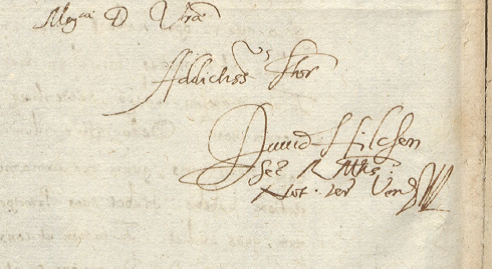Masterpieces of Humanism in Livonia: David Hilchen’s epistolography as a source of language, literary, juridical and educational history
Personal Research Funding project PUT1030 (2016–2019)
The Research project is focused on the at present unpublished and unexplored Latin correspondence (ca 800 letters) of David Hilchen (1561–1610), secretary and syndicus of Riga (1585–1600), and acknowledged as central humanist of Livonia and key figure in terms of political, legal, educational, linguistic and literary influence. Our goal is to edit, comment and publish his letters in two volumes, and digitalize an English inventory of it on the website Early Modern Letters Online. We endeavour to contextualize northeastern Europe’s solely remaining collection of letters in different contexts via series of research articles.

The main topics of analysis are
- the development of written legal argumentation and its reception within and beyond Early Modern court procedures
- the reception of antiquity (aspects of literary history, multilingualism, Roman law)
- humanist educational models (jesuits versus lutheran)
- social networking patterns among leading European humanists (Lipsius, Caselius, etc)
The results provide a thoroughly new picture about the Livonian humanism.
Principal investigator
- Kristi Viiding
Senior research staff
- Thomas Hoffmann, PhD
- Hesi Siimets-Gross, PhD
Other research staff
- Mari Linder, MA (01.01.2016−30.06.2017)
Project results
The project was the first literature research project in the Republic of Estonia which explicitly focused on the Polish period in Estonia and Livonia (1561-1621/29). The research was mainly based on the Latin literary legacy of David Hilchen (1561-1610), a leading Livonian Early Modern humanist lawyer, which was to this purpose – as far as known and accessible – collected in its entirety from archives and librariesall over Europe and consecutively transcribed, amounting till date to 800 letters, 39 poems, and 28 orations. The inventory of Hilchen’s letters is published in the international web platform EMLO. Hilchen’s poems and two volumes of letters (provided with German annotations, commentaries and an updated biographical and historiographical introduction) are ready for publishing at a German publishing company. In total, 26 scientific presentations were held at various conferences and seminars, and 20 articles were published in high-raking journals across Europe.
Hilchen’s inventory and the edition of his letters are important tools for any Early Modern scholarly work on political, religious, literary and publishing history not only in the Baltic Sea region, but throughout all Europe, as Hilchen’s network of 200 correspondents of humanists, politicians, lawyers, state officials and diplomats spanned from England and France to Poland and Livonia. Within the project, many prosopographic and biographical details of leading humanists were refined.
Our team is especially proud about the clarity and interdisciplinary significance of three of our research results, which are that
- we could confirm the hypothesis that Early Modern lawyers treated in their letters contemporary legal theories and practices exactly in the same rhetorical manner as ancient lawyers – esp. Cicero – did, referring to various legal issues, but without providing a systematic or detailed picture of legal issues and without using strict legal terminology;
- we rebutted the claim that Hilchen’s Land Law provided for a particularly strict form of Baltic serfdom in Livonia, as it was previously assumed in the wide-spread theory that its regulations on serfdom were based on Roman Law, and
- we discovered Hilchen’s plan to develop the Riga Cathedral School into the first university in Livonia in the late 1590s as a counter-measure to king Stephan Bathory’s endeavour to found a Jesuit university in Riga.
International events
- Training School COST-Action IS1310 “Reassembling the Republic of Letters“
13th–16th March 2018 in Tallinn - International conference “Letters, Law and Court in Polish Livonia – the Case of David Hilchen“
16th–17th April 2019 in Tallinn
